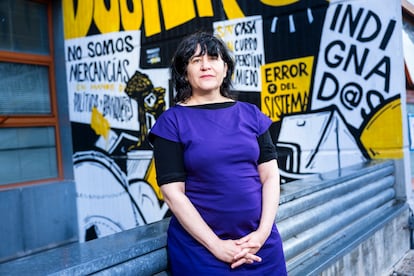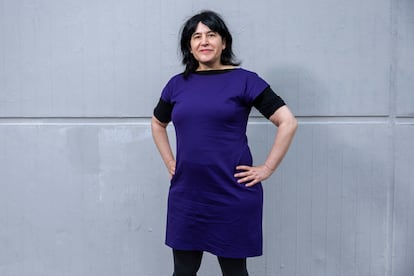Melinda Cooper, sociologist: ‘The family is the neoliberals’ alternative to the welfare state’
The Australian professor has written a book that focuses a light on the American right, where free market principles merge with puritanism


Capitalism today is overseeing the global rollback of rights. A reactionary tension that Melinda Cooper, 52, a professor of Sociology at the Australian National University, relates to the historical alliance between neoliberals and conservatives. It’s a fusion of the principles formulated by the Chicago School with the religious puritanism that brought Ronald Reagan to power in the 1980s, and since then, has only become stronger, crystallizing with Trumpism, Jair Bolsonaro supporters in Brazil and now with Javier Milei in Argentina. In her book Family Values, the Sydney-born researcher traces the political genealogy that goes back to the first instances in which traditionalists and champions of economic deregulation found common ground: the defense of marriage and denying women’s rights. The same fiery issues that are devouring America today.
Question. How has the American right changed since Donald Trump's victory?
Answer. We are witnessing a radicalization of the right and the political ascendancy of far-right elements that for the first time have a place in the mainstream Republican Party. Inspired by the Southern “states’ rights” tradition of rebellion against the federal government and nostalgia for slavery, hostility toward the state even involves taking up arms, as seen in the 2021 assault on the Capitol. This resurgence of white racism and misogyny has even led to the repeal of federal abortion protection.
Q. You say that the decision of some Republican members of Congress to refuse to raise the debt ceiling is part of that same attempt at destabilization, although there was finally an agreement in May to avoid a government shutdown.
A. These lawmakers see abortion and the federal debt as symptoms of the same original sin. They argue that the dissolution of the family has forced them to pay for services such as healthcare and education that should remain in the private sphere, and they are seeking to accelerate the arrival of divine punishment.
Q. It’s not just the extreme right that wants to limit women’s rights. In your book, you analyze Bill Clinton’s role in this regard.
A. Clinton’s 1996 welfare reform appropriated benefits to fund marriage promotion programs. It allocated millions of dollars to states capable of reducing the abortion rate and, at the same time, the births of illegitimate children.

Q. Are American liberals (in an economic sense) as committed to family as conservatives?
A. Yes, although for different reasons. Conservatives promote abstinence and monogamy, liberals tell women that they must bear the economic costs of not getting married.
Q. What do you mean?
A. There is a long tradition in English-speaking countries of locating the parents of children receiving social assistance. Instead of paying benefits directly, the state finances the search for men who have no ongoing relationship with the mother who requests this help. It is inefficient, but this is how women are told that their economic security comes exclusively from marriage.
Q. Are progressives being effective in countering these ideas?
A. They debate them, they put forward scientific arguments, but they need a global and proactive vision, beyond always being on the defense. Throughout history, the left has been a beacon only when it had its own project. I sensed something similar to that in the Bernie Sanders campaign during the Democratic primaries, but then it dissipated. Argentina, Iran and Poland — where feminists have made a great effort to confront the religious right — offer important lessons to the Western left on how to challenge family policies, both on the neofamil and conservative fronts.
Q. Some on the left also defend those family values.
A. I find the idea that resistance to capitalism needs some kind of anchoring in the family dangerous, as if they were two antagonistic concepts. I argue that historically there has never been pure economic liberalism since the latter needs to defend the protection of wealth, hence inheritance. Although they seek the absolute freedom of the individual, neoliberals have pursued policies to protect the family. It is their alternative to the very welfare state they want to dismantle.
Q. Most of your research activity has focused on the United States. Why?
A. People often talk about the English-speaking world, but the United States has nothing to do with Australian politics, I find it a strange and fascinating country. What happens there has implications for the rest of the world, it is a laboratory of ideas. Look at Milei.
Q. He is just as extreme as Trump.
A. Yes, but people identify with them. We need to analyze the psychological implications of that. [German philosopher] Theodor Adorno developed the concept of the great little man. This is a leader who projects a certain image of omnipotence, but at the same time is close to the people.
Sign up for our weekly newsletter to get more English-language news coverage from EL PAÍS USA Edition
Tu suscripción se está usando en otro dispositivo
¿Quieres añadir otro usuario a tu suscripción?
Si continúas leyendo en este dispositivo, no se podrá leer en el otro.
FlechaTu suscripción se está usando en otro dispositivo y solo puedes acceder a EL PAÍS desde un dispositivo a la vez.
Si quieres compartir tu cuenta, cambia tu suscripción a la modalidad Premium, así podrás añadir otro usuario. Cada uno accederá con su propia cuenta de email, lo que os permitirá personalizar vuestra experiencia en EL PAÍS.
¿Tienes una suscripción de empresa? Accede aquí para contratar más cuentas.
En el caso de no saber quién está usando tu cuenta, te recomendamos cambiar tu contraseña aquí.
Si decides continuar compartiendo tu cuenta, este mensaje se mostrará en tu dispositivo y en el de la otra persona que está usando tu cuenta de forma indefinida, afectando a tu experiencia de lectura. Puedes consultar aquí los términos y condiciones de la suscripción digital.








































